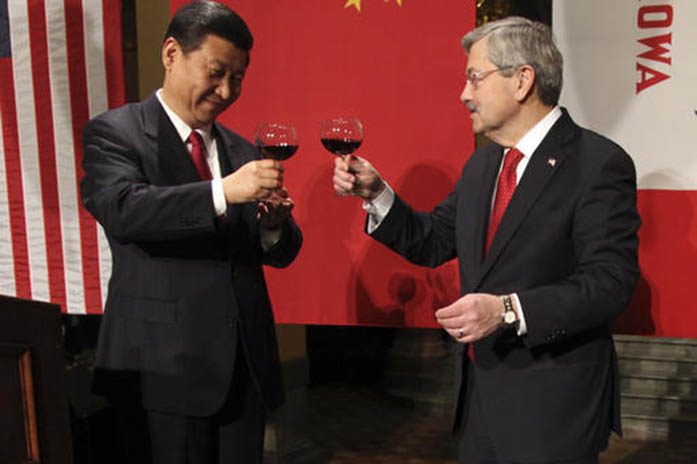Former Iowa Gov. Terry Branstad to resign as U.S. ambassador to China next month
Former Iowa Gov. Terry Branstad will step down as U.S. Ambassador to China early October and return to Iowa, according to the U.S. Embassy. The statement did not give a reason for his departure.
FILE – In this Feb. 15, 2012 file-pool photo, Chinese Vice President Xi Jinping and Iowa Gov. Terry Branstad raise their glasses at the beginning of a formal dinner in the rotunda at the Iowa Statehouse in Des Moines, Iowa. Branstad, President-elect Donald Trump’s choice for U.S. ambassador to China, can boast a 30-year relationship with Chinese President Xi Jinping, the most powerful Chinese leader in decades, especially amid escalating talk of a trade war with the U.S.’s largest trading partner? (AP Photo/The Des Moines Register, Andrea Melendez, Pool, File)
September 14, 2020
U.S. Ambassador to China and former Iowa Gov. Terry Branstad will step down and depart Beijing early next month and return to Iowa, according to a statement from the U.S. Embassy in Beijing.
Branstad, a Republican, confirmed his decision to end his three-year ambassadorship in a phone call with President Trump last week, the statement said.
In an internal meeting at the U.S. Embassy on Monday, Branstad thanked his staff and said he is most proud of his work in negotiating a phase one trade deal between the U.S. and China “and delivering tangible results for our communities back home,” the statement said.
In the phase one trade deal signed in January 2020, China agreed to strengthen intellectual property laws and to increase U.S. imports by $200 billion above 2017 figures. The U.S. agreed to reduce some tariffs placed on China.
“We are rebalancing the U.S.-China relationship so that it is fair and reciprocal and can fuel positive growth in both countries,” Branstad said at the Monday meeting, according to the statement.
Trump’s ongoing trade negotiations with China resulted in a $28 billion federal relief package for farmers across the U.S. who endured a hit in farm income due to the trade war. In 2018, Trump imposed tariffs on hundreds of Chinese products, and China placed retaliatory tariffs on U.S. agriculture and automobile products.
According to the BBC, the U.S. has imposed tariffs on more than $360 billion of Chinese products, and China has imposed $110 billion in retaliatory tariffs.
Branstad served as governor of Iowa for 22 years, from 1983 to 1999, and again from 2011 to 2017. The statement did not give a reason for Branstad’s departure.
China’s state-owned People’s Daily newspaper declined to run an op-ed written by Branstad last week, saying the article was “full of loopholes and seriously inconsistent with facts.”
The op-ed calls for a reciprocal relationship between the two countries and accuses Chinese leadership of stealing American technology and operating in bad faith.
Iowa Republican leaders took to Twitter on Monday to recognize Branstad’s work. Sen. Joni Ernst, R-Iowa, who is also up for re-election in a competitive race, said Branstad “made Iowa proud” during his years of service in Beijing.
You’ve made Iowa proud, Ambassador Branstad! Thank you for your service to our nation over the past three years. We can’t wait to welcome you back home. God bless you and your family. https://t.co/PwKWjfs7of
— Joni Ernst (@SenJoniErnst) September 14, 2020
Sen. Chuck Grassley, R-Iowa, complimented Branstad for his “outstanding service.”
Once again I compliment Amb Terry Branstad for his outstanding service as ambassador to China It continued his dedication to public service after 22+ yrs being governor of Iowa. Terry, I look fwd to welcoming you back to Iowa!
— ChuckGrassley (@ChuckGrassley) September 14, 2020
Iowa Gov. Kim Reynolds — former lieutenant governor to Branstad and eventually his successor — said she’s grateful for Branstad’s service and for representing the U.S. “during some of the most challenging times for trade and diplomacy.”
As Ambassador to China, Terry used his work ethic, dedication, love for Iowa ag, and his long-time friendship with the Chinese people to represent us during some of the most challenging times for trade and diplomacy. Grateful for his service and proud to welcome him back home. pic.twitter.com/jHCO8wMjL3
— Gov. Kim Reynolds (@IAGovernor) September 14, 2020
Iowa state Sen. Mariannette Miller-Meeks — Republican candidate in Iowa’s 2nd Congressional District — thanked Branstad, saying “public service does not have to be about blind ambition.”
Throughout his career, Ambassador Branstad has worked tirelessly on behalf of Iowans and has always put his constituents first.
Thank you for showing that public service does not have to be about blind ambition but instead, it can be about promoting the public good. #ia02
— Dr. Miller-Meeks (@millermeeks) September 14, 2020



